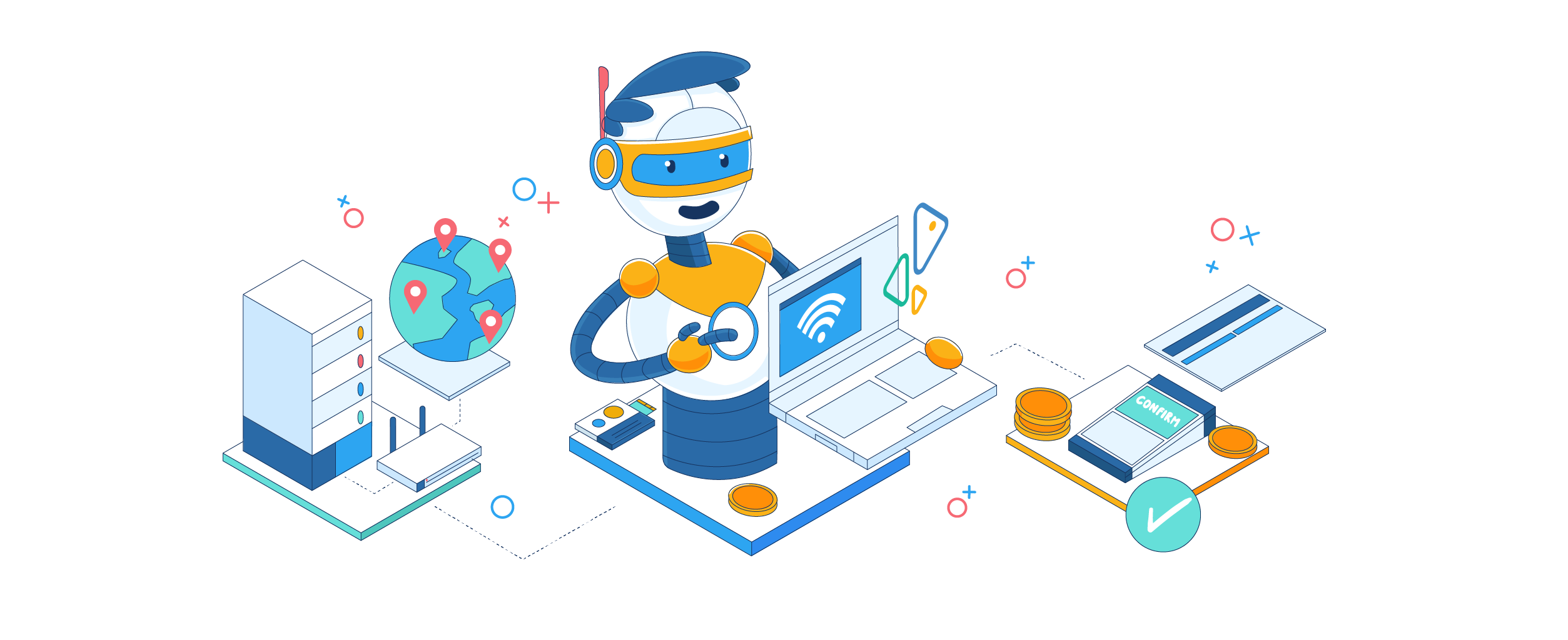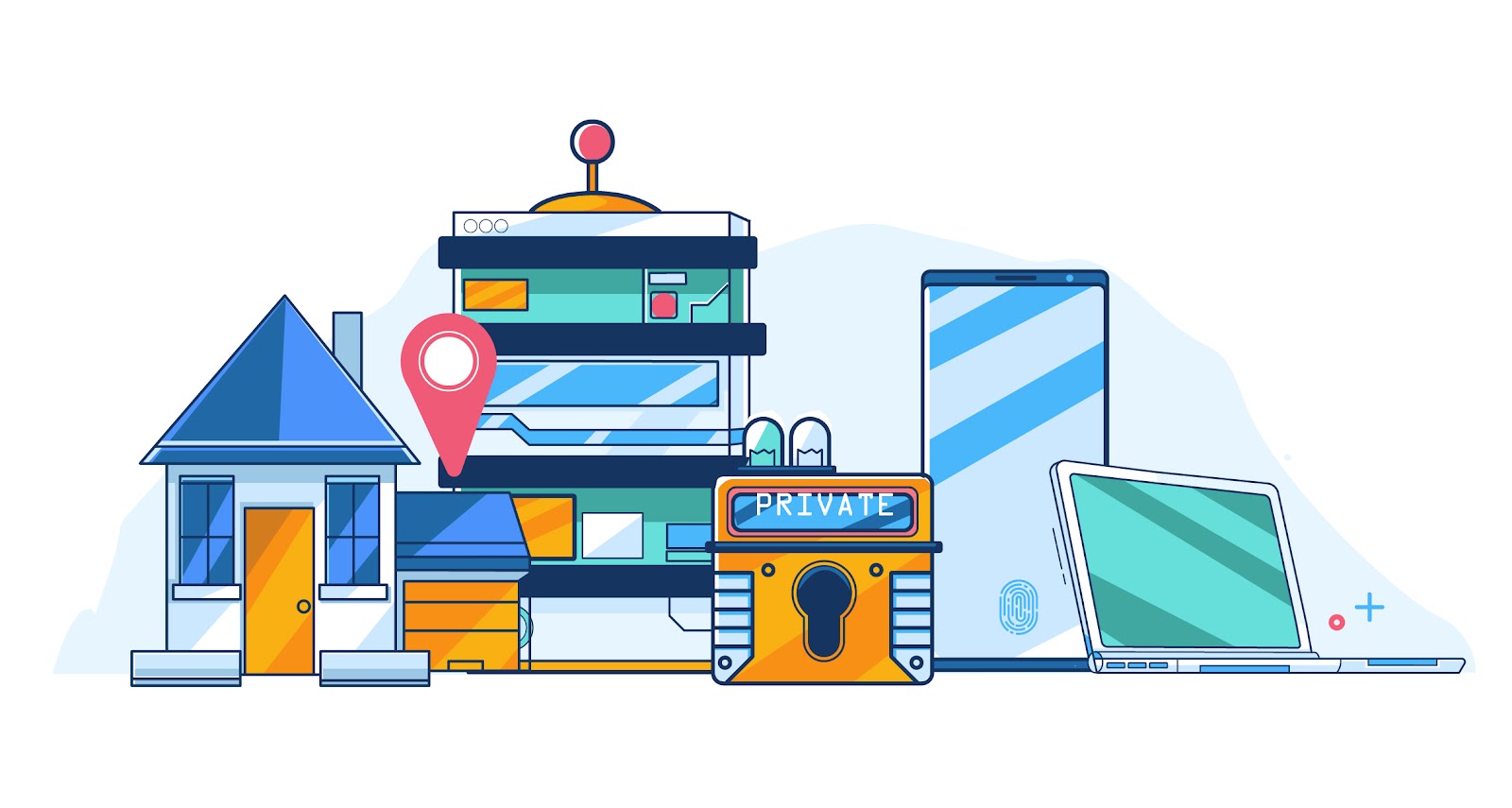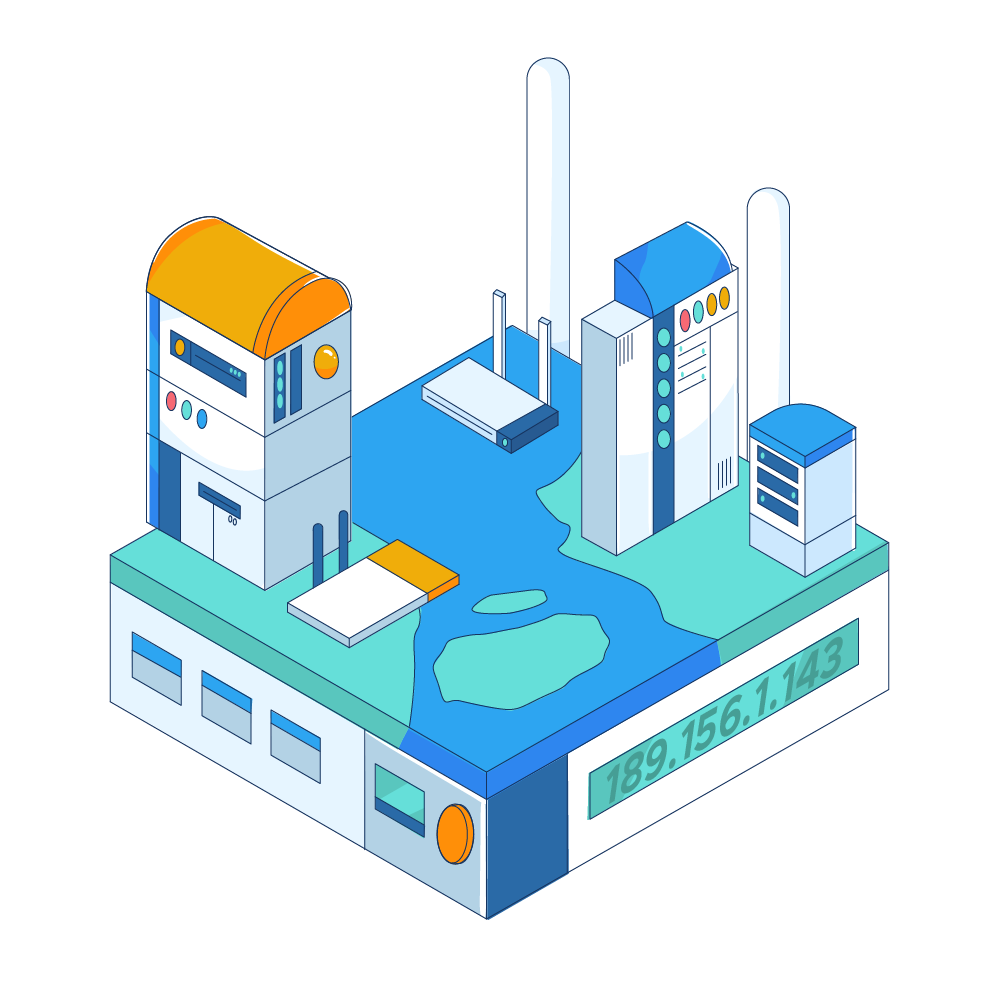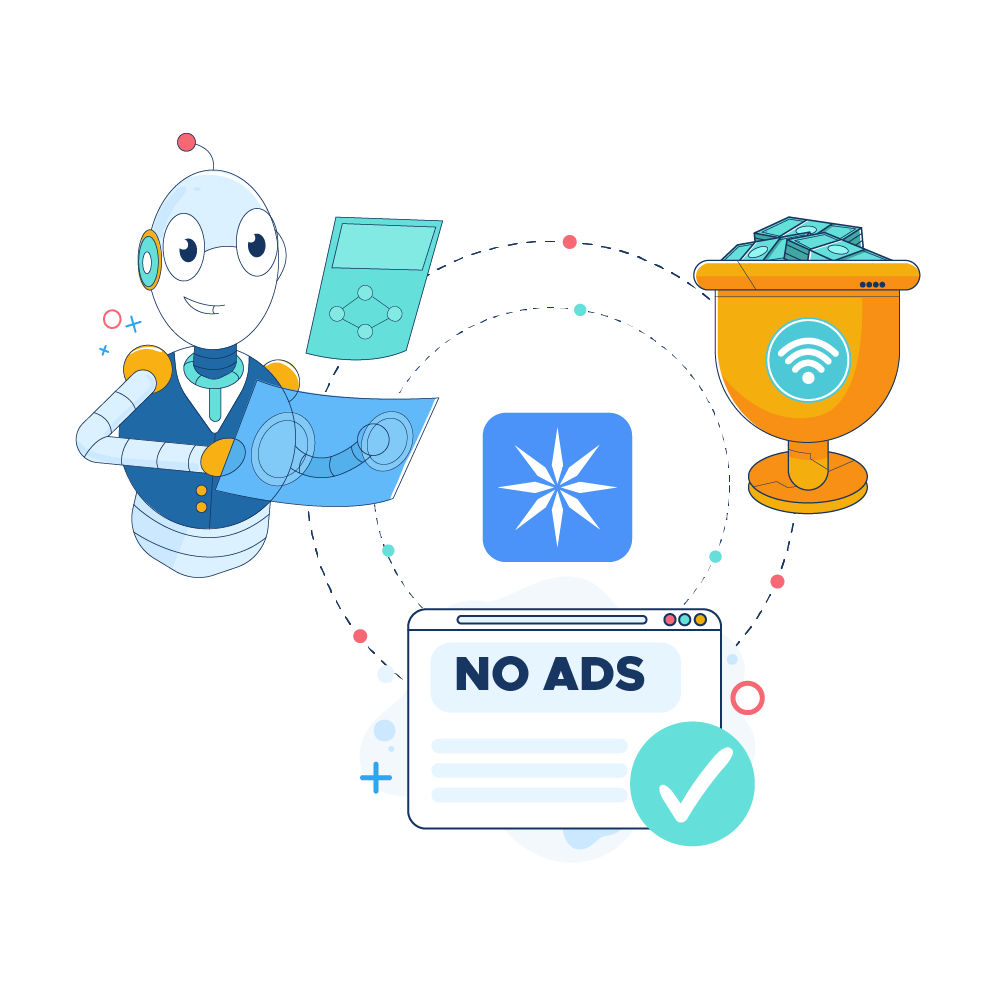ROTATING RESIDENTIAL PROXIES
Special Rotating Proxies
Rotating residential proxies with worldwide geo targeting optimized for high success rates.
Basic Rotating Proxies
Rotating residential proxies with random geo location.
Fast Rotating Proxies
Rotating residential proxies with worldwide geo targeting optimized for scraping and data gathering.
On Demand Proxies
Residential proxies with on demand rotation, geo targeting using user and password authentification.
Most Popular Types of Proxies for Business Purposes

Companies that are involved in web scraping activities would have a difficult time without proxies missing the essential web data that can make a difference in online marketing, sales intelligence, or e-commerce, to provide just a few examples.
To have a better view of how proxies can become beneficial for business purposes, we need to discover the most popular cases and applications. But first, let’s start with a short introduction to proxies to understand why they are important for companies that need online data.

Why do we need a proxy?
We are all aware that every time we go online our devices leave a trace that may lead back to us. Our IP addresses can reveal the name of our Internet Service Providers, our countries, our cities, and even our streets.
And if a normal user may want to avoid revealing the IP address in the online space for security and privacy reasons, companies that need to engage in web scraping activities are mostly interested to have a clear path towards the content they target for business reasons.
Why is it so important for companies to access particular content from various websites via proxies?
Companies that are involved in data extraction, market research, SEO, sales, web testing, and online shopping activities will always look to make sure the data they obtain is relevant and up-to-date so they will always be interested to find tools that can deliver results. And this is where proxy server companies come into play.
But how do proxies help companies that need to scrape web data?
First of all, we already know that a proxy server acts as an intermediary door between us and the online sites we need to reach by changing the IP addresses of our devices.
To be more specific, our requests will actually be handled by a proxy server that provides its own IP address protecting (the privacy of) our real IP addresses in the process. So, during our online browsing activities, we will always have a middleman that collects the information first before passing it further on to us.
Is there anything more besides proxies’ power of hiding our IP addresses?
Though it is true that the main purpose of proxy servers is to hide users’ IP addresses, proxies come with numerous cases and applications helping us to find a method for classifying them according to their purposes.
One major element to be remembered is that individuals use proxies for privacy reasons, while companies use proxies mostly for accessing relevant business content.
However, not all proxies are the same and, besides online privacy, many of them come with enhanced features that serve specific purposes so companies will always try to use proxies they consider appropriate for their commercial interests.
Most Popular Proxy Servers

There are many types of proxy servers available to companies that are looking to accomplish various objectives. To simplify our proxy servers overview, we will try to categorize the most popular types of proxies according to the applications they serve:
- Residential, datacenter, and mobile proxies
- Static and rotating proxies
- HTTP, HTTPS, and Socks proxies
- Transparent and anonymous proxies
- Open, Private, Web, and CGI web proxies
- Used and unused proxies
Residential and datacenter proxies
Residential and datacenter proxies are probably the most popular types of proxies for companies looking to access online data for their business objectives. These proxies act as reliable intermediaries between enterprises and the online places they target, masking a user’s real IP address and opening doors to restricted content.
- Residential proxies
Residential proxies are appealing to the numerous companies that need to reach a particular type of web data for business purposes and have to make sure they will be successful, especially when dealing with geo-restricted content.
Residential proxies offer users access to home IP addresses that belong to individuals from all over the world. These IP addresses are provided by Internet Service Providers to everyday users that offer them to proxy server companies in return for other services.
Though residential IPs may be slower than datacenter IPs, they are generally more reliable for companies that need to make sure they access the required data.
- Datacenter proxies
Datacenter proxies are IP addresses that are associated with an ISP, but without the end user. These types of proxies are delivered by data centers in various countries providing a set of virtual IP addresses that mask the original IP address.
The main advantages provided by datacenter proxies reside in the speed and accessibility they offer to customers that need to obtain business data from the online space for various business cases.
The main disadvantage of datacenter proxies comes from the fact that they are easy to detect and block, which compels companies to choose the higher levels of privacy and legitimacy offered by residential proxies.
For more information on residential and datacenter proxies, check our dedicated blog post: ‘Residential vs Datacenter Proxies: Pros and Cons’ to discover the main advantages and disadvantages of using these types of proxies for your business.
- Mobile proxies
Mobile proxies assist users by directing their requests through cellular networks usually accessed by mobile devices. The IP addresses delivered by mobile proxies are issued by mobile network providers from various countries.
Static and rotating proxies
- Static proxies
Static proxies provide users with fixed IP addresses that can be used as long as it is required. Most of the time, static proxies are directly assigned by data centers or ISPs but without any middleman, which results in high speeds, improved connectivity and availability.
Since these proxies are delivered by ISPs, they offer the necessary legitimacy and privacy for online scraping jobs. At the same time, as static proxies are linked to physical locations, the final users benefit from the appearance of regular connections.
- Rotating proxies
Rotating proxies, also known as backconnect proxies, are usually referred to as residential proxies since they change in an automatic fashion the IP addresses.
A rotating proxy server is usually considered to be the perfect choice for online scraping activities and other difficult jobs where companies need to acquire valuable information from hard-to-get places.
HTTP & HTTPS and Socks proxies
These proxies can be considered to be based on the Internet protocols they use.
- HTTP & HTTPS proxies
The HTTP proxy server uses Hyper Text Transfer Protocol (HTTP) to connect to the web server or the browser, so we have an HTTP client and an HTTP server. The HTTP & HTTPS proxies assure secure connections for the websites you access.
The HTTP proxy routes the HTTP requests from a user’s browser to the Internet and supports numerous features to allow for higher speeds and better times of response.
HTTPS is the classic HTTP protocol plus the Secure Socket Layer (SSL), a layer of security added to HTTP to offer better protection and end-to-end encryption in order to keep online criminals at bay.
It is thus only normal to imagine proxy servers employing SSL to create increased security levels for users who connect from a client to the web server or when accessing online data. With HTTPS Proxies, users stay safe when engaging in financial transactions or when introducing credentials on various websites.
- SOCKS5 proxies
SOCKS5 is a newer and improved version of the SOCKS Internet protocol. The main advantage of SOCKS5 stands in its ability to support both TCP and UDP connections while delivering higher security and privacy. Generally, the SOCKS protocol is preferred by users for intensive tasks, such as online streaming and peer-to-peer data sharing.
To send and receive data packets faster and more securely, the SOCKS5 protocol employs UDP connections to route traffic via a proxy server. Both the HTTP and SOCKS protocols have the ability to conceal a user’s IP address when looking to avoid geographical barriers.
However, the main reason to use a SOCKS5 proxy resides in its ability to improve user communication by accessing a UDP connection to tackle traffic-demanding activities, such as online gaming, video streaming, and live chat apps.
Transparent and anonymous proxies
- Transparent proxies
Transparent proxies intercept the user requests processing the traffic before sending it further to the server. They act as a doorway that stands between the clients’ requests and the final destination to provide authentication and permission of access. We can find transparent proxies in public Wi-Fi spots offering access to users that provide the right credentials, though they also cache content for higher browsing speeds.
- Anonymous and high anonymous proxies
The anonymous proxies are simply used to preserve anonymity in the virtual space. With an anonymous proxy server, users make sure their IP addresses are never disclosed when going online or accessing restricted sites.
The high anonymous proxies, also known as elite proxies, offer the same level of security but with additional capabilities that manage to hide the fact that the user employs a proxy to remain hidden in the online space. At the same time, high anonymous proxies change the IP address from time to time to increase anonymity and online privacy.
Open, Private, Web, and CGI web proxies
- Open proxies
Open proxies, also known as public proxies, do not require any advanced means of configuration. Though they are free to access by anyone, they are many times used for illegal purposes and are not recommended for serious usage, especially by a company.
- Private proxies
When talking about private proxies, we have to consider proxies that can be accessed only with the right set of credentials. Private proxies are not for general usage and are usually acquired from well-known proxy server providers for business purposes.
Further on, there are two main types of private proxies: dedicated and shared proxies.
Dedicated proxies (or private proxies) are simply used by a single user offering increased quality and top security. They are generally preferred by companies that are involved in online scraping activities where high performance is key.
Shared proxies are generally accessed by several users at the same time. Since the bandwidth is shared with more people, we are obviously dealing with a reduced scraping performance and the increased possibility of getting blocked. Shared proxies come indeed at a lower cost than dedicated proxies.
- Web proxies
This is a popular use case of a proxy that is located on a website that can be easily accessed by users who want to go online. There is no need to configure the proxy server and the user can just go ahead to visit the desired sites. It offers privacy for your own IP address and opens the possibility to access restricted websites.
- CGI Web proxies
CGI comes from Common Gateway Interface, which is a web interface where you can insert your target webpage. The CGI Web Proxy is not considered a safe option for online scraping activities as the information can be ‘read’ by your host.
Used and unused proxies
- Used proxies
Used proxies are indeed proxies that have been put to work in the past and they might have been blocked or restricted for a period. However, as most sites remove the proxy ban after some time, users may still obtain good results with these proxies.
- Unused proxies
Unused proxies are also known as virgin proxies since they have not been used before reducing the risk of going online with a set of restricted proxies. Generally, unused proxies have not already been employed for the websites you want to target and are sold many times for a limited number of sites.
Protecting your brand with a proxy is also possible. Read more about it on our blog.
What type of proxies do you require for your business?
Though we tried to reveal in our blog post that we have a great number of proxies that address various purposes when choosing a proxy network it all comes down to a simple question: why do you need a proxy?
What type of web data do you require for your business projects and what websites do you want to target?
As our company is serving enterprises that are interested to obtain online data for business purposes, there are generally two main options on the table: residential and datacenter proxies.
Now, though we are very much tempted to suggest residential proxies for your business, we have to admit that in multiple cases datacenter proxies may just be enough to get the job done.
For instance, you may need to collect web data for market research or for SEO purposes. In this case, datacenter proxies might be all you need as they still provide a fast and stable connection. At the same time, datacenter proxies do come at a lower price range.
Nevertheless, if you’re involved in business projects that demand reliable sales intelligence or a price comparison overview of your competition where accurate data is key, maybe you should start considering residential proxies.
Contact us to find out more about types of proxies for business purposes.
This category's latest stories

4 Simple Reasons Businesses Love To Use Proxies
Businesses love proxies for many reasons. In this article, we focus on the most important benefits for SEO, social media, online sales, and pricing.

What are Datacenter Proxies and How They Can Help your Business
Do you want to find out how datacenter proxies can support your business development? Check out our article and find out how they can support business!

6 Myths About Proxy Server Solutions
Are you aware of all the myths that surround proxies? Let’s debunk the most popular myths about proxy server solutions. Check out our blog post!
Featured Articles

News
02.12.2024
Introducing Ice Payments on Shifter
Discover seamless crypto transactions with Ice payments on Shifter. Streamline your proxy service purchases and unlock new opportunities with Ice integration.

Residential Proxies
04.04.2023
8 Myths About Proxies. What You Should Know?
Are you aware of all the myths and stories surrounding proxies? Check our article and test your knowledge of proxies’ true limits in the online environment.

News
03.21.2023
Looking for an Alternative to Pi Network? Why ice Network is the Perfect Solution
Find more about the tremendous advantages of the ice Network and mining ice coins, as many are starting to take notice, ultimately choosing to leave Pi Network to have access to better, more rewarding opportunities.
Shifter's legacy
Shifter was founded in 2012, as one of the first residential proxy providers, since then it has become one of the leading proxy networks in the world and it's used by more than 25.000 clients including Fortune 500 Companies. Users can connect from anywhere to access local data without any restriction, while preserving a high degree of privacy and security.